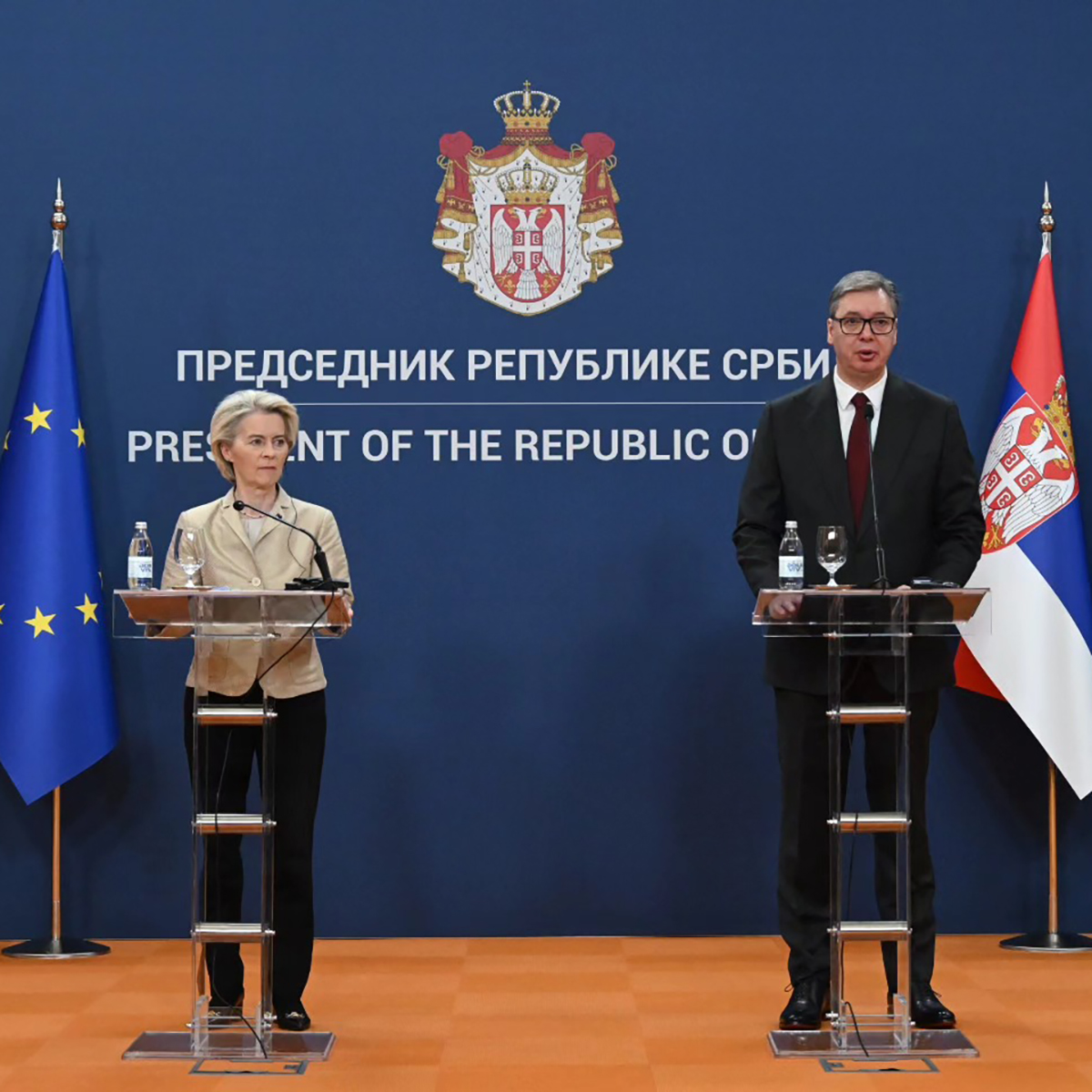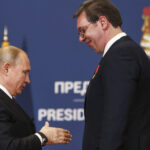- The EU calls on Serbia not to delay reforms and to impose sanctions against Russia
European Commission President Ursula von der Leyen, during her visit to Belgrade as part of her tour of Western Balkan countries, called on Serbian President Aleksandar Vučić to demonstrate “concrete progress” in key reforms necessary for the country’s advancement on its path toward European Union membership, including the alignment of foreign policy, primarily the introduction of sanctions against Russia.
Von der Leyen clearly outlined the EU’s requirements, emphasizing the need for actions rather than words: “Now is the moment for Serbia to get concrete about joining our Union. Therefore, we need to see progress on the rule of law, the electoral framework, and media freedom”.
Particular emphasis was placed on the alignment of foreign policy: “We must see greater alignment of our foreign policy, including with the sanctions against Russia. I commend you for reaching 61% of alignment with our foreign policy … but more is needed. We want to count on Serbia as a reliable partner.”
President Vučić, while reaffirming the country’s European course, made it clear that this is a difficult path: “Membership in the European Union is a strategic commitment and a priority of our foreign policy… We will try to implement what is called the reform program, and I hope that we will have the support of the European Union… [But] it is not always easy and not entirely simple to present this fully to the people here.”
Observers noted that the tone of the negotiations was tougher than during previous visits by EU leaders, which indicates growing frustration in Brussels with the current policy of Belgrade.
The German publication DW noted that von der Leyen was more “restrained,” and Vučić more “conciliatory,” emphasizing that the EU official for the first time spoke so clearly in favor of values that include “the right to peaceful assembly” and “partnership instead of subordination,” which was a transparent reference to recent internal developments in Serbia.
Experts also drew attention to the clearer demands regarding the introduction of sanctions against Russia within the framework of Serbia’s foreign policy alignment with that of the EU. “No time period is being granted for the harmonization of this policy as it was before, and it was always prolonged. Now it is being demanded clearly, and I would say, in the short term,” said Igor Bandović from the non-governmental Belgrade Centre for Security Policy to Radio Free Europe (RFE).
- Albania, Montenegro, and North Macedonia received funding under the EU Growth Plan for the Western Balkans
On 16 October, the European Commission announced the allocation of funding to Albania, Montenegro, and North Macedonia under the EU Growth Plan for the Western Balkans.
“This decision recognizes the significant reforms that the partners have undertaken to better align with EU standards,” the EC press release states.
Albania will receive the first tranche amounting to €99.3 million, of which €46.2 million will be paid directly into the state budget, while the remaining funds will support infrastructure projects through the Western Balkans Investment Framework (WBIF).
Montenegro will receive the second tranche amounting to €8.1 million, including €3.8 million paid directly into the state budget, while the rest is designated for infrastructure projects through WBIF.
North Macedonia will receive the second tranche amounting to €16 million, of which €7.4 million will be paid directly into the state budget, and the rest will go toward financing infrastructure projects through WBIF.
After approval by the WBIF Board of Directors, these funds will support infrastructure projects in areas such as sustainable transport, clean energy, digital technology development, and human capital, in close cooperation with Western Balkan partners and international financial institutions.
Since the launch of the Growth Plan for the Western Balkans, the total amount of disbursements has reached €99.3 million for Albania, €18.3 million for Montenegro, and €25 million for North Macedonia.
The Growth Plan is an EU financial initiative worth €6 billion (for the 2024–2027 period) aimed at accelerating the economic convergence of the Western Balkans with the EU. “The Growth Plan stimulates the preparation of partners for enlargement for EU membership by offering benefits that precede full EU integration. This, in turn, accelerates the enlargement process and the growth of their economies,” the European Commission’s statement concluded.
Bosnia and Herzegovina, Kosovo, and Serbia were not included in this round of disbursements for various reasons.
The Parliament of Kosovo, due to the prolonged delay in forming the parliament after elections earlier this year, has not yet ratified the agreements allowing the allocation of funds from EU instruments.
Bosnia and Herzegovina adopted its Reform Agenda (a prerequisite for receiving funds) only recently and with a major delay. Accordingly, all necessary procedures for receiving funds under the Growth Plan have not yet been completed.
Serbia was not included among the countries that received the next tranche from the EU for reasons not officially disclosed. Experts name two likely obstacles: reform stagnation and misalignment of foreign policy (primarily the non-introduction of sanctions against Russia).
- The United States lifted sanctions against four officials from Republika Srpska
The Office of Foreign Assets Control (OFAC) of the U.S. Department of the Treasury on 17 October lifted sanctions previously imposed on four officials from Republika Srpska (Bosnia and Herzegovina).
These are Daniel Dragičević, Chief of Staff to the President of Republika Srpska; Jelena Pajić Bastinac, Secretary-General of the RS Presidency; Dijana Milenković, Director of Radio Television of Republika Srpska (RTRS); and Goran Raković, who was Chief of Protocol in the RS President’s Office.
All four were sanctioned for participating in the organization of the celebration of Republika Srpska Day on 9 January. OFAC at that time stated that the celebration of RS Day contradicted previous rulings of the Constitutional Court of Bosnia and Herzegovina, which twice declared the celebration of 9 January as RS Day unconstitutional.
Despite the lifting of sanctions on these four individuals, the United States continues to apply restrictive measures against a number of senior officials and businessmen from Republika Srpska, including Bosnian Serb leader Milorad Dodik and member of the Presidency of Bosnia and Herzegovina Željka Cvijanović, for their actions aimed at undermining the Dayton Peace Agreement.
The decision to lift sanctions against the four RS officials prompted a swift and positive reaction from Dodik. He had previously called the American sanctions “politically motivated” and initiated by the “people of Biden,” and now welcomed the lifting of restrictions, expressing hope that the process of sanction removal would continue. “We are managing to make some people understand that everything is politically motivated, and I believe we will succeed,” Dodik concluded.
According to journalists, in December last year the government of Republika Srpska signed a contract with an American law firm to lobby in the U.S. for the lifting of sanctions against RS officials, as well as to promote dialogue between RS and the administration of Donald Trump.
The current lifting of sanctions against the four individuals is seen as a sign of a softening or even a review of U.S. policy toward Republika Srpska. However, American authorities emphasize that the policy of supporting the sovereignty, territorial integrity, and multiethnic character of Bosnia and Herzegovina remains unchanged.
- Local elections in Kosovo passed peacefully
On 12 October, local elections in Kosovo took place in a calm atmosphere and without serious incidents. According to the Central Election Commission, only a few minor delays in the opening of polling stations in some areas and cases of ballot photographing were reported during the day.
Voter turnout reached nearly 40 percent, lower than in the 2021 local elections (a little over 43 percent). More than 2.5 million citizens were eligible to vote in these elections.
The results of mayoral candidates in several cities were close, and therefore a second round of voting will be required for final results. In particular, none of the candidates won more than 50 percent of the votes to be elected mayor in Pristina.
The main Serb party in Kosovo, Serb List, which had boycotted previous local elections, participated in this campaign with active public support from official Belgrade. As a result, Serb List won in most Serb-majority municipalities in the first round, including Leposavić, Zubin Potok, Zvečan, North Mitrovica in northern Kosovo, and Gračanica near Pristina. In Klokot, in southeastern Kosovo, the Serb List mayoral candidate advanced to the second round against a candidate from the Serbian National Unity Party.
President of Kosovo Vjosa Osmani and acting Prime Minister Albin Kurti accused Serbia of interfering in the electoral process in Kosovo by “bribing” the Serb community to vote for Serb List and called on the EU to respond. Official Belgrade denied these accusations.
- A rally in support of the leaders of the Kosovo Liberation Army was held in the Albanian capital
Thousands of citizens participated in a rally at Skanderbeg Square in Tirana on 17 October in solidarity with former leaders of the Kosovo Liberation Army (KLA/UÇK) being tried at the Kosovo Specialist Chambers in The Hague.
The event was organized by the Organization of Veterans of the Kosovo Liberation Army and was held under the slogan “Freedom Has a Name” (Liria ka emër).
At the Kosovo Specialist Chambers in The Hague, former Kosovo President Hashim Thaçi, who was the political leader of the Kosovo Liberation Army during the war, former Kosovo Assembly Speaker Kadri Veseli, who was head of the KLA intelligence service, former Kosovo Assembly Speaker Jakup Krasniqi, who was the KLA spokesperson, and former MP Rexhep Selimi, who was a member of the KLA General Staff, are on trial. The former KLA leaders are accused of war crimes and crimes against humanity committed in Kosovo and certain areas of Albania between March 1998 and September 1999. None of the defendants have pleaded guilty.
During the rally in Tirana on 17 October, speakers emphasized the justice of the war for Kosovo’s liberation and expressed support for the former KLA leaders.
Former Albanian President Alfred Moisiu stressed that the KLA’s struggle “was righteous and pure, and its leaders are imprisoned on the basis of unfounded accusations.”
Ali Ahmeti, one of the founders of the KLA and leader of the Democratic Union for Integration (DUI) in North Macedonia, stated that “justice is being called into question by the actions of the Specialist Court.” He emphasized that the KLA “did not violate the laws of war and defended its people from genocide.”
The head of the parliamentary group of Albania’s ruling Socialist Party, Taulant Balla, met after the rally with Pristina Mayor Përparim Rama and the son of former Kosovo President Endrit Thaçi, who participated in the rally. “Stronger when we are together,” Balla wrote on social media.
Albanian Prime Minister Edi Rama posted in support for the rally on his official Facebook page. Rama did not attend the protest, as he stated, because he did not want politicization to harm the purpose and popularity of the event.
Opposition Democratic Party of Albania leader Sali Berisha, following the protest, emphasized that the accusations against the former leaders had not been substantiated during the trial and were fabricated by Belgrade “and the enemies of the Albanian nation.” According to him, the Democratic Party supports justice, opposes any attempt to equate liberators with aggressors, and calls on the court in The Hague to declare the KLA leaders innocent.
The trial of the four former Kosovo Liberation Army leaders began in 2023, three years after their arrest and detention at the court in The Hague. The trial is expected to conclude by the end of December.
A few days ago, the court in The Hague denied Hashim Thaçi’s request for release from detention, which caused dissatisfaction among KLA supporters in the region.



